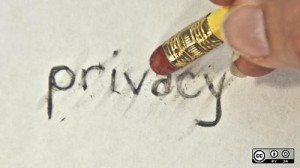Centre for Law, Justice and Journalism Annual lecture by Baroness Buscombe

Changing times indeed. In the age of online and social media, facebook and Twitter reign supreme and ‘lack of privacy’ has reached new heights with our likes and dislikes becoming commercial fodder for websites like Amazon. Now, anyone and everyone can become a journalist. All you need to do is start writing and blogging. Create your own website or blog and ‘Voila!’ You’re instantly global. What then of British media ethics and integrity? Do they still exist? And if you see something inaccurate published, who can you complain to?
Chairman of the Press Complaints Commission (PCC), Baroness Buscombe, shed some light on these issues at the Centre for Law, Justice and Journalism Annual lecture on 12 October. Aptly named “Changing times and changing media regulation,” the Baroness’s lecture was a thought-provoking one, which gained the full attention of the guests from the media, journalism students and the odd law student, as she discussed the challenges of media and regulatory convergence, technology development and international regulation in the light of current affairs.
Should regulatory convergence match media convergence? The suggested answer is a resounding no as there appears to be no way statutory control can keep pace with technology. How then do you instil a sense of professional standards in a person who calls himself a journalist in a time where the speedy access of information can destroy personal lives and commercial enterprises at the touch of a button?
With that in mind, the work done by media content regulators, one of which is the PCC, which deals with the effective ‘taking down’ of articles or pictures resulting in apologies published in a matter of days or weeks, must be encouraged. And the key to this media affair lies in persuasion rather than compulsion, with the non-statutory self-regulatory system playing the central role as the divergent culture and nature of different media cannot be effectively captured by statute – each and every case being bespoke and dealt with on its own merits.
At the same time, the self-regulatory system is not a one-size fits all model, but a flexible one, being able to adapt and respond to changes in culture such as aspects of discrimination without the need for primary legislation. Contrast this with intervention by Parliament, which almost always takes years. More importantly, self-regulation can adapt easily to changes in technology. The PCC, for example, has recently begun to consider whether Twitter messages are capable of being “private” and therefore outside the boundaries of what can be published by the press.
Managing media by compulsion on the other hand, by the intervention of nation states, is doomed to fail when one considers the very nature of media. Creative content has a value that must be acknowledged by all future media regulatory systems. Adapting that effectively to online media however, needs further thought, but as the Baroness suggests, “we need to get on and think fast” before media evolves again.
And regulation certainly needs to be credible to be trusted. For while maintaining freedom of expression, journalists will want to do so in an environment that respects their profession and the work they do. They should welcome reform that can achieve this balance. To illustrate her point, the Baroness highlighted the issue of newspaper blogs that publish abusive and often inaccurate information. Female journalists in particular, are susceptible to incredibly unpleasant blogs following articles written, with the current scenario being one where newspapers are loathe to edit information as this makes editors “legally responsible” for what they publish.
Under the existing system, compliance to the Editors’ Code of Practice is voluntary and this must be changed. Otherwise the system lacks credibility. Why should the public trust a system when they can only come to the PCC to seek redress against a certain newspaper, but not against another, simply because the latter’s publishers have opted out of the system? Or if a publisher is in the system, but does not like adjudication, he is at liberty to opt out of the system altogether, which is not sustainable in practice or principle.
The solution? The Baroness suggests that, “there should be some form of back stop power, vested in another body and, given that body needs sufficient powers to demand compliance, it will, regrettably have to be one regulated by the state. This need not … compromise freedom of expression … it is just to ensure that compliance with the system is universal and no one can just choose to opt out.”
Culture and practices in the British media too must change and adapt to the rapid pace of technological changes. Adherence to the Editors’ Code should be a condition of employment and in the contracts of journalists and editors. Within media organisations, there is also an emphasis on a whistle-blowing system, so that “any beleaguered journalist can have free access without fear, to a second opinion as to his/her rights in law.”
In the age of connectivity, where everyone is just a click or phone call away, international collaboration is also heavily stressed. Government support at national level, not intervention, is necessary to develop a system with international standards of ethics. Where, for example, all websites complying with the system carry an internationally recognised mark to give readers confidence that the sites are to be trusted, as opposed to a free for all. Such a system will encourage more publishers to opt in to the system, for “people want to read something they can believe”.
Another issue to be considered is cyber terrorism, which impedes or diminishes the security of nation states. Faced with this, the media may not be necessarily equipped to recognise that published information may put lives at risk and damage diplomatic relations. Those privy to such sensitive data will need to direct the media when it is right to be constrained, circumspect and on occasions, even silent.

In the wake of these current world issues shadowed by the departure of the Northern & Shell Group, under which newspapers and magazines include The Daily Express and OK! magazine from the PCC system, and the Leveson Inquiry – judicial review into the culture, practices and ethics of the British media – it seems another new era is upon the press. Following regulation, will the balance between freedom of the press shift against protected individual privacy? And if so, will it keep up with the constantly evolving form of the media? As the debate heats up, it seems we may not have long to find out…
Lord Hunt of Wirral takes over from Baroness Buscombe as Chairman of the PCC.
Watch the full lecture or read the speech yourself via the Centre for Law, Justice and Journalism, City University. Read other accounts from Judith Townend on her Meeja Law blog and via the blog of Jon Slattery, freelance journalist.
Marie Tay is a former copywriter and editor who has just begun her GDL at The City Law School.
